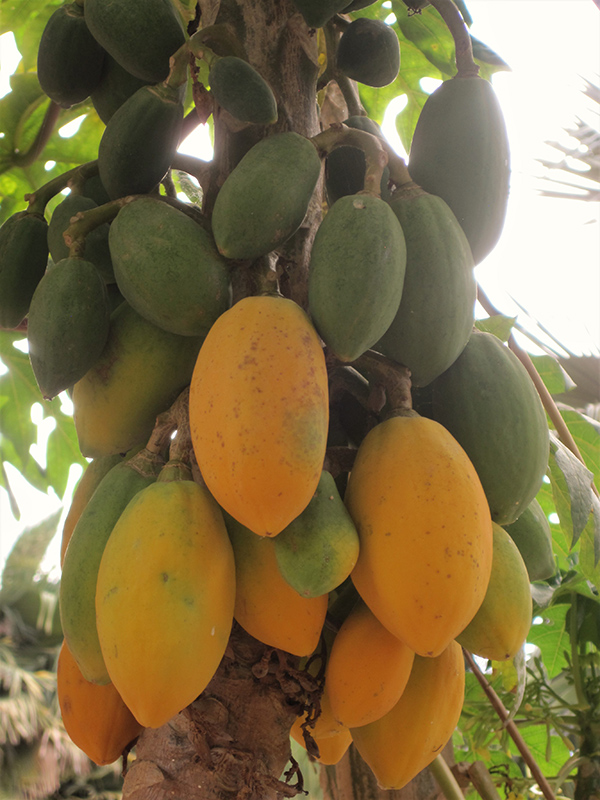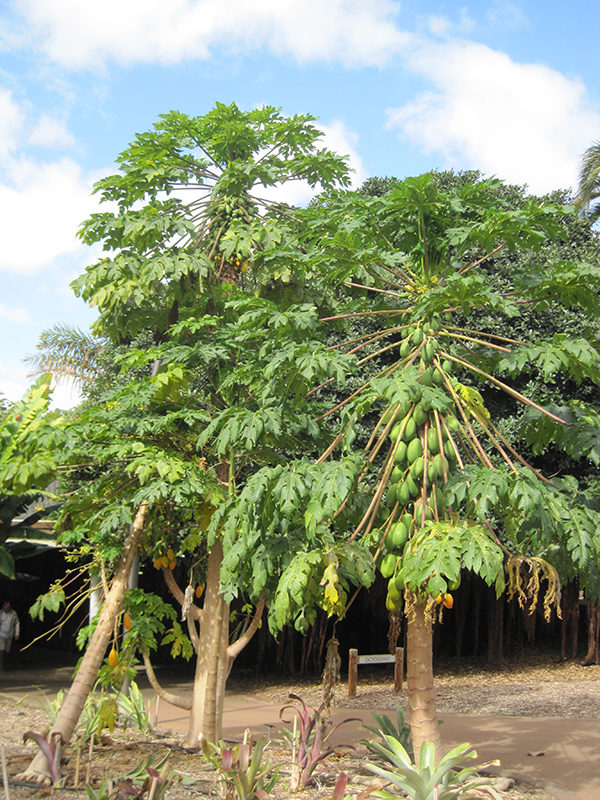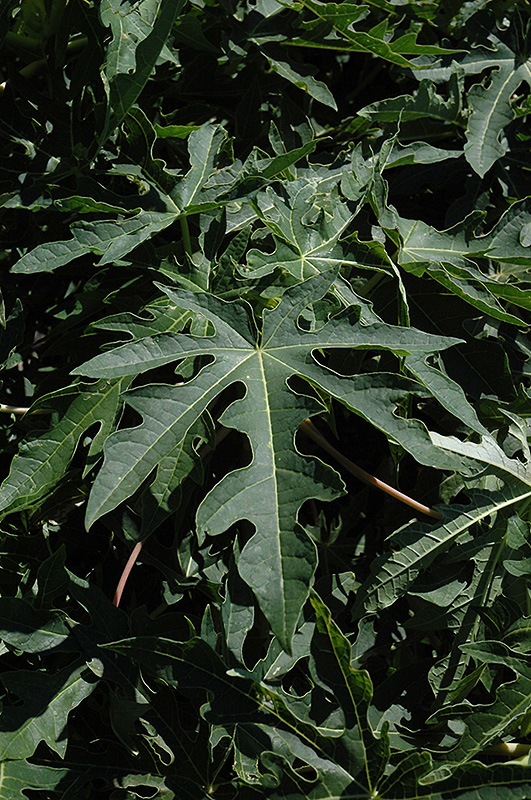Height: 20 feet Spread: 10 feet
Sunlight:
Hardiness Zone: 9 Description: A small succulent, broadleaf evergreen tree that may bear papaya fruits throughout the year; its non-woody trunk bears scars of old leaf bases, topped with an umbrella-like canopy of large palmately lobed leaves; excellent for containers Edible Qualities Papaya is a small tree that is commonly grown for its edible qualities. It produces gold oblong fruit (technically 'pomes') with a yellow blush and pink flesh which are typically harvested when mature. The fruits have a sweet taste. The fruit are most often used in the following ways: Features & Attributes Papaya has attractive dark green evergreen foliage on a tree with an upright spreading habit of growth. The lobed palmate leaves are highly ornamental and remain dark green throughout the winter. The fruits are showy gold pomes with a yellow blush, which are carried in abundance in late fall. The fruit can be messy if allowed to drop on the lawn or walkways, and may require occasional clean-up. The gray branches add an interesting dimension to the landscape. This is an evergreen tree with a strong central leader and an upright spreading habit of growth. Its relatively coarse texture can be used to stand it apart from other landscape plants with finer foliage. This plant will require occasional maintenance and upkeep, and should not require much pruning, except when necessary, such as to remove dieback. It is a good choice for attracting birds, bees and butterflies to your yard. It has no significant negative characteristics. Aside from its primary use as an edible, Papaya is sutiable for the following landscape applications; Planting & Growing Papaya will grow to be about 20 feet tall at maturity, with a spread of 10 feet. It has a low canopy with a typical clearance of 3 feet from the ground, and is suitable for planting under power lines. It grows at a fast rate, and under ideal conditions can be expected to live for approximately 10 years. This plant is typically grown in a designated edibles garden. It should only be grown in full sunlight. It prefers to grow in average to moist conditions, and shouldn't be allowed to dry out. It may require supplemental watering during periods of drought or extended heat. It is not particular as to soil type or pH. It is somewhat tolerant of urban pollution. This species is not originally from North America. Papaya is a good choice for the edible garden, but it is also well-suited for use in outdoor pots and containers. Its large size and upright habit of growth lend it for use as a solitary accent, or in a composition surrounded by smaller plants around the base and those that spill over the edges. It is even sizeable enough that it can be grown alone in a suitable container. Note that when grown in a container, it may not perform exactly as indicated on the tag - this is to be expected. Also note that when growing plants in outdoor containers and baskets, they may require more frequent waterings than they would in the yard or garden. Disclaimer - This Plant Finder tool is an online resource representing many of the varieties that we carry over the course of the season, and is intended for informational purposes only. Inventory varies seasonally, so we cannot guarantee that every plant will be in stock at all times - please contact the store directly for current availability. It does not include our entire selection of plants, so be sure to visit our store to see varieties that may not be represented on this list.All Seasons Plant Finder
![]()
![]()
![]()
![]()
![]()
![]()
![]()
![]()
![]()
![]()
![]()
![]()
![]()
NetPS Page
Characteristics
Applications
Features & Attributes
Browse Our Website
Our Services
Contact Information
Phone: (337) 264-1418
Email: info@buyallseasons.com
Location: 2974 Johnston St Lafayette, LA 70503
Business Hours:
Monday-Saturday 8am-6pm •
Sunday 9am-5pm






